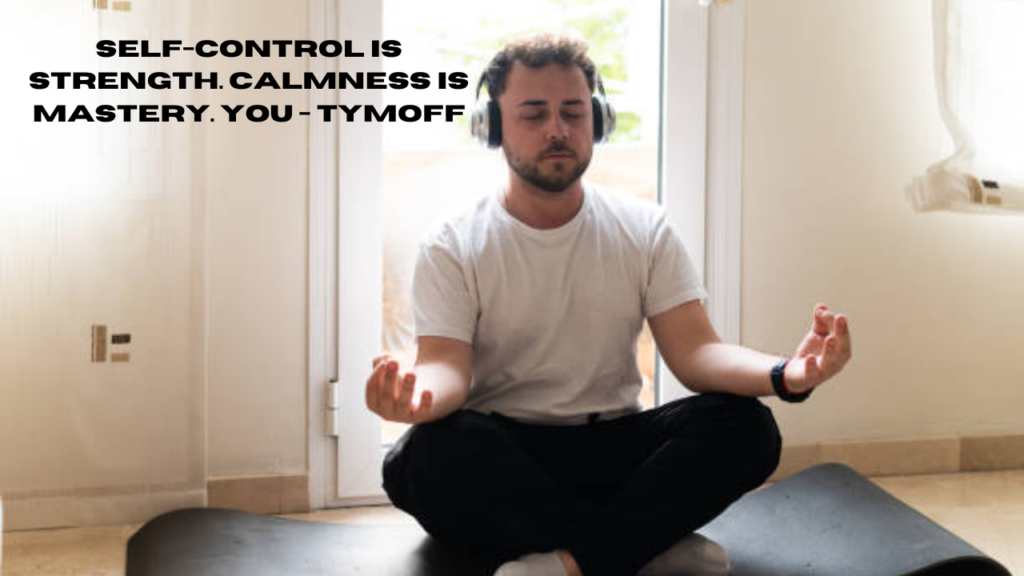In a world filled with distractions, emotional turbulence, and constant pressure, achieving mastery over oneself is a pursuit that demands focus and dedication. Self-control is strength. Calmness is mastery. You – Tymoff—this profound statement encapsulates the essence of personal growth and emotional intelligence. It serves as a guiding principle for those seeking true inner strength and balance in their lives. But what exactly does it mean? Why is self-control equated with strength, and why is calmness considered mastery? Let’s delve deep into this philosophy and understand how it can transform our lives.
Why Is Self-Control Strength?
The Power of Resisting Temptation
Self-control is not merely about denying oneself pleasures or suppressing desires; it is about making conscious choices that align with long-term well-being. The ability to resist temptations—unhealthy habits, impulsive reactions, or unproductive distractions—demonstrates immense inner strength. Whenever you choose discipline over indulgence, you exercise strength that fortifies your character.
Emotional Regulation
True strength is not about overpowering others but mastering oneself. When faced with adversity, challenges, or provocation, a person with self-control does not react impulsively. Instead, they assess the situation with a clear mind and respond thoughtfully. This ability to regulate emotions, rather than being controlled by them, is a defining trait of inner strength.
Achieving Goals and Success
Success is not an overnight achievement; it requires persistence, dedication, and patience. Self-control enables individuals to stay committed to their goals, resisting the urge to quit when faced with obstacles. Those who possess self-control are better equipped to delay gratification, which is crucial in achieving long-term success.
Overcoming Weaknesses
Each person has personal weaknesses, be it procrastination, negative thoughts, or harmful habits. Overcoming these requires willpower and discipline. The stronger one’s self-control, the more capable they are of transforming weaknesses into strengths. This resilience is what truly defines strength in an individual.
Why Is Calmness Mastery?
The Art of Composure
Mastery is not about controlling external factors but maintaining inner peace regardless of circumstances. Calmness allows individuals to handle stressful situations with grace and wisdom. When faced with conflicts or crises, a calm person remains centered, making rational decisions rather than reacting emotionally.
Improved Decision-Making
A calm mind is a clear mind. When emotions cloud judgment, decisions often become hasty or irrational. Calm individuals take the time to analyze situations logically, ensuring better outcomes. This clarity of thought is what makes calmness an essential element of mastery.
Enhancing Relationships
People gravitate towards those who exude calmness. A calm demeanor fosters trust, making interactions smoother and more meaningful. Whether in personal relationships or professional settings, individuals who remain composed are more respected and admired. They are also better at conflict resolution, avoiding unnecessary arguments and misunderstandings.
Gaining Control Over Life
Life is unpredictable, and challenges are inevitable. However, those who have mastered calmness do not let external chaos disrupt their inner peace. They understand that while they may not control everything that happens to them, they can control how they respond. This self-mastery enables them to navigate life with confidence and ease.

How Can You Cultivate Self-Control and Calmness?
Mindfulness and Meditation
Practicing mindfulness helps develop self-control and calmness. Meditation trains the mind to stay focused, enhances emotional regulation, and brings a deep sense of peace. Regular meditation allows individuals to respond to situations with awareness rather than react impulsively.
Setting Clear Goals
Having a clear purpose makes it easier to exercise self-control. When goals are well-defined, distractions and temptations lose their power. Keeping a vision of what you want to achieve reinforces discipline and commitment.
Developing Emotional Intelligence
Understanding emotions, both yours and others, is crucial in mastering self-control and calmness. Emotional intelligence involves recognizing triggers, managing reactions, and responding with empathy and wisdom. This skill is essential for maintaining balanced relationships and personal growth.
Practicing Patience
Patience is a fundamental aspect of both self-control and calmness. It teaches individuals to endure difficulties without frustration and trust the growth process. Practicing patience allows for better problem-solving and resilience in challenging times.
Maintaining a Healthy Lifestyle
Physical well-being impacts mental and emotional health. Regular exercise, a nutritious diet, and adequate sleep enhance self-control by reducing stress and improving focus. When the body is well-nourished, the mind functions optimally, leading to more excellent emotional stability.

Also Read: Clever DPSCD: A Game-Changer for Digital Learning
The Journey to Mastery Begins with You
This philosophy’s core lies in a simple truth: transformation starts from within. Self-control is strength. Calmness is mastery. You – Tymoff—this statement is a quote and a way of life. It serves as a reminder that true power does not come from dominating others but from mastering oneself.
By practicing self-control, you develop the strength to overcome distractions, stay focused, and build resilience. By cultivating calmness, you master your emotions, make thoughtful decisions, and handle life’s challenges with grace. Together, these qualities shape a person who is successful and at peace with themselves.
Embracing this mindset can lead to profound changes in every aspect of life. The journey may not be easy, but the rewards—inner strength, emotional stability, and a life filled with purpose—are worth the effort. Start today, take control, and become the master of your destiny.































Comments 1